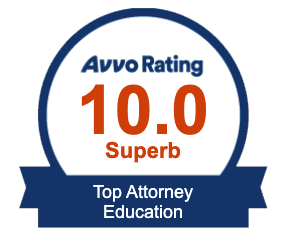Much as been written and litigated on the subject of an independent educational evaluation. The IDEA provides that a parent must be informed of the right to request an independent educational evaluation or IEE. 34 C.F.R. 300.502. So what does this mean? In short, a parent must be informed of the right to obtain an independent educational evaluation at public expense by the school system. Public expense means the school system must either pay for the full cost of the IEE or ensure that the evaluation is otherwise provided at no cost tot he parent. When the parent requests an IEE, the school system has two choices: it can either file a request for a due process hearing to show that its evaluation is appropriate or ensure that an IEE is provided to the parent at public expense unless the school system shows at a due process hearing that the evaluation obtained by the parent does meet criteria established by the school system. Even if the parent does not prevail at the due process hearing, the parent always has the right to obtain an IEE but not at public expense. It is important to remember that a parent cannot request an IEE until and unless the school system has evaluated the student.
Parents often obtain IEE’s because they do not trust or believe that the school system’s evaluation is not appropriate. The cost of an IEE varies depending upon the type of evaluation obtained. An independent occupational therapy may cost a few hundred dollars. On the other hand, a neuropsychological or other extensive evaluation could easily cost more than two thousand dollars. I have known school systems to spend tens of thousands of dollars for their attorneys to pursue a due process to defend its own evaluation of the student rather than pay a $1,000 to $2,000 for an IEE. Why? Sometimes the school system gets dug into a war with the parent about the appropriateness of their evaluations. You would think that a school system would rather pay for the IEE then spend tens of thousands of dollars to pay their attorneys? In many cases, school system agree to pay for an IEE rather than spend considerable funds for litigation. Even so, the parent does not have unbridled discretion to secure an IEE. The school system can establish criteria applicable for IEE’s, including the location of evaluation, the qualifications of the evaluator, and the criteria must be the same criteria that school system uses when it initiates an evaluation.
If a parent obtains an IEE at public expenses, or shares with the IEP committee a private evaluation, then the committee must consider the IEE, it it meets school system’s criteria, for the provision of the child’s free appropriate public education. The operative word is “consider.” A school system is not bound to follow a parent’s private IEE. In some cases, however, a school system will accept a parent’s private IEE in lieu of conducting its own evaluation. A parent may only obtain one IEE at public expense each time the school system conducts its own evaluation with which the parent disagrees.
These are some of the important rules for an IEE. This post is not exhaustive on the subject of an IEE by any means. But it should give you some guidance on whether you want to pursue an IEE.

